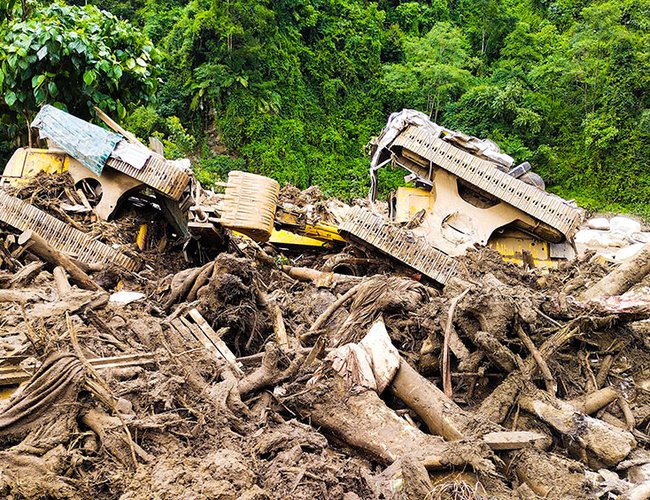
Least Developed Countries (LDCs) face significant challenges in achieving sustainable development. Graduating from LDC status is a milestone, but it also comes with costs and impacts, especially regarding climate change.Graduating from the status of Least Developed Countries (LDCs) symbolizes progress towards this goal. As we approach COP 28, it becomes essential to factor in the implications of LDC graduation and the urgent need for sustainable support for these nations.
LDC graduation serves as an indicator of a country's economic development, involving a meticulous evaluation process. Criteria include Gross National Income (GNI) per capita, Human Assets Index (HAI), and Economic Vulnerability Index (EVI). To be eligible for graduation, a country must meet two of the three criteria consistently throughout two consecutive triennial reviews by the United Nations Committee for Development Policy (CDP).
LDCs, despite contributing minimally to climate change, bear the brunt of its devastating consequences due to their vulnerability. Graduation further exacerbates this vulnerability by curbing access to vital international support measures imperative for climate change adaptation and mitigation. When LDCs graduate, they lose access to some of this support, such as the Least Developed Countries Fund (LDCF) and preferential market access arrangements. This can make it more difficult for them to build climate-resilient infrastructure and protect their populations from the impacts of climate change.
The United Nations Conference on Trade and Development (UNCTAD) highlights a potent implication of LDC graduation on global climate change response. LDCs stand as an example by which history will judge the world's response to this pressing crisis. Hence, graduation inadvertently signals to the international community that these countries no longer require special treatment, potentially diminishing the urgency of coordinated action against climate change. This must serve as a wake-up call for the international community.
Bhutan is poised to achieve a milestone by transitioning from the ranks of Least Developed Countries (LDCs) to a middle-income country. United Nation’s Under Secretary General Rabab Fatima recently stated that “Several forms of LDC-specific support will cease after graduation. The world is already grappling with multiple, overlapping crises, which will also impact Bhutan after graduation”. However, this remarkable progression is mirrored by the trajectory of six additional countries in the pipeline, projected to graduate within the next four years or by 2026, with five in Asia and two in Africa. Amidst these triumphs, the undercurrent of human-induced climate change continues to cast a shadow over their collective development endeavors.
LDC graduation is a rigorous evaluation process that considers a country's Gross National Income (GNI) per capita, Human Assets Index (HAI), and Economic Vulnerability Index (EVI). Countries that meet two of these criteria consecutively for two triennial reviews are eligible to graduate. As Nepal approaches graduation in 2026, it is crucial to examine the consequences related to climate change.
The imminent graduation of Nepal from its Least Developed Country (LDC) status serves as a prime example. Nepal, being a profoundly susceptible nation currently witnessing the repercussions of human induced climate change, faces an added challenge upon its transition out of the LDC status. This transition will heighten the intricacies of adapting to these climate shifts and mitigating their consequences.
Nepal faces the compounded challenge of heightened vulnerability to adverse conditions driven by human-induced climate change due to its geographical location in the Himalayan landscape. This susceptibility is further compounded by the looming potential of transitioning from the Least Developed Country (LDC) status, which could disrupt essential support mechanisms required for effective adaptation. Adding to this vulnerability is Nepal's unique geography, which makes it highly susceptible to the impacts of climate change. The nation is extremely exposed to a range of natural hazards including floods, landslides, and droughts, with climate change exacerbating these risks and imperiling crucial sectors such as agriculture, water resources, hydroelectric projects, and ecosystems. Consequently, the potential loss of access to international support measures, vital for both climate change adaptation and mitigation, further intensifies Nepal's overall vulnerability.
Nepal, as an LDC, has benefited from critical international support that have strengthened its efforts towards climate change adaptation and mitigation. However, the graduation process implies the loss of these vital sources, presenting tough economic challenges. For Nepal, the potential consequences are significant. The loss of preferential market access, debt relief, and official development assistance (ODA) will impact its ability to sustainably address human induced climate change.
As Nepal, an exceptionally vulnerable nation characterized by low income levels, weak infrastructures and economic fragility, embarks on the path of LDC graduation, the stakes are high. While commendable strides have been made towards sustainable development, the forthcoming process of graduation unveils significant costs and impacts. In light of this, the urgency to address Nepal's distinctive predicament becomes even more distinct as the global community converges at COP 28.
The country, situated in the fragile Himalayan region, is exceptionally vulnerable to the impacts of climate change. Graduating from LDC status intensifies this susceptibility, Nepal may lose access to international support measures crucial for climate change adaptation. Funding schemes like the Least Developed Countries Fund (LDCF) have supported Nepal in implementing climate-resilient infrastructure projects and enhancing disaster preparedness systems. The loss of such funding could hinder the country’s ability to protect itself against the adverse effects of human induced climate change.
Furthermore, Nepal's LDC graduation could affect its ability to export climate-friendly goods and services. The termination of preferential market access schemes may hinder the growth of Nepal's climate-friendly industries, preventing it from realizing its full potential in contributing to global climate change mitigation efforts.
The world needs to come together to find solutions that will help LDCs continue to address climate change even after they graduate from the LDC category, with a particular focus on gender-specific impact of LDC graduation.
It is essential to prioritize the needs of women and girls in LDCs and ensure that they receive the necessary support to continue their efforts in combating climate change. COP 28 provides an opportunity to address the specific challenges faced by women in LDCs in the context of climate change. The world must take urgent action to address the gendered impact of LDC graduation on climate change.
As Nepal journeys towards LDC graduation, COP 28 provides a crucial opportunity for global leaders to address the specific challenges faced by Nepal and other LDCs that are graduating. It is imperative for the international community to recognize the unique vulnerability of Nepal and other LDCs, and extend continued support for their climate change adaptation and mitigation efforts. This support must include financial resources, technological assistance, and capacity-building initiatives tailored to Nepal's post-graduation needs. COP 28 should be a forum where nations unite to ensure the continuity of Nepal's momentum towards sustainable development and resilience is maintained.
In conclusion, Nepal's upcoming graduation from LDC status presents both opportunities and challenges, especially regarding climate change. The international community must act now to provide Nepal with the necessary support to build back better and become more resilient to address the impacts of human induced climate change. Prioritizing the needs of women and vulnerable groups in Nepal is also crucial. At COP 28, let us work together to ensure that Nepal and other LDCs can create a more resilient, sustainable and an equitable future for us all.

Arup Rajouria
is an internationally recognized expert in climate change and natural resources management, with an impressive career at renowned organizations such as the former CEO of NTNC's CEO, UNDP, UN-Habitat, UNEP, and USAID. He obtained an MPA degree from Harvard
- Himalayan Meltdown: Threat Beyond Borders
- May 10, 2024
- Navigating The River of Doubts: The Evolving Dynamics Of India-Nepal Water Relations
- Jan 08, 2024
- A Cry From The Himalayas: Echoes Of Hope And Compromise At COP-28
- Dec 21, 2023
- Climate Crisis: Can world Leaders Rise to the Challenge ?
- Nov 17, 2023
- Conflict Diverts Attention: How the Hamas Israel Crisis Affects Climate Priorities At COP 28
- Oct 28, 2023
















